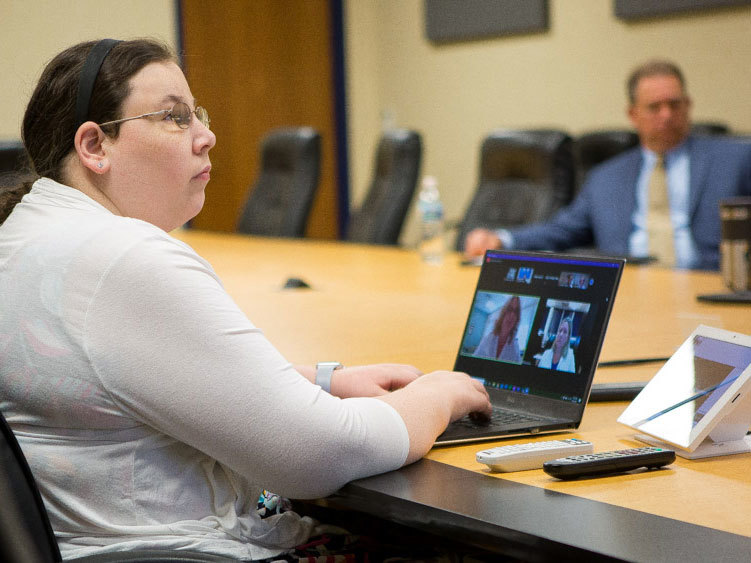Right now in West Allis, the Industry for the Blind and Visually Impaired is doing some very important advocacy for a workforce of able-bodied employees who don’t always get the attention they deserve.
IBVI, an agency that works with the National Industries for the Blind (NIB), creates job opportunities with for the visually impaired, largely through a government project called AbilityOne. This federal initiative mandates that a percentage of contracts go to organizations that employe people with disabilities, and IBVI is one of Wisconsin’s largest employers of blind people. They produce office and janitorial supplies, as well as mission-critical equipment to the government.
And this summer, they had a chance to lobby our state legislators for more support.
Alison Fortney is an account and e-commerce specialist with IBVI. During her sessions with state senators and representatives, she spoke on behalf of IBVI to discuss changes to upcoming changes to the AbilityOne program – including eliminating any sub-minimum wages, updating current direct labor ratio requirements, correcting outdated definitions of significant disability, and more.
NIB hosts a public policy forum each year, but this time, Fortney says she wanted to talk to legislators about H.R. 2373, the Competitive Integrated Employment Act.
“There are a few organizations who are still paying their employees sub-minimum wages, says Fortney. “We want to eliminate that. The bill is going to assist employers, providing employment under special certificates issued under section 14(c) of the Fair Labor Standards Act, and did, transferring their business and program models. They support individuals with disabilities through competitive integrated employment. And they're also wanting to phase out the use of such special certificates.”
Fortney also spoke to state government representatives about the blind working ratio requirements. While the law provides that blind people account for 75 percent of direct labor through AbilityOne and the Javits-Wagner-O'Day Act, it doesn’t apply to employees in managerial positions or customer service.
Says Fortney, “We're wanting to change that because this labor ratio reflects outdated perceptions of the capabilities of people who are blind. This gives the impression that employees with disabilities are somehow ineligible to work in customer service or other managerial jobs, which is completely untrue, because we do give employees here the opportunity to transfer from one job to another.”
Fortney, who has worked for IBVI for five years, says her meetings were generally well-received, which as a visually-impaired person herself, was rewarding. She notes, “70% of the blind and visually impaired population is either unemployed or underemployed.”
And that, she says, needs to change.
Fortney points out that progress is being made. She says technology helps visually impaired people get work done, and even on the factory floor, being blind doesn’t prevent employees from being productive workers.
"It's mostly tactile and experience,” she says. “You have some people working at the same machine for an extension of time, they get to learn how to do it. It's the same with putting the pens and the brushes together.”
Among other clients, IBVI works with the military, creating promotional materials, as well as Goodwill, Habitat for Humanity, Easter Seals, AmeriCorps and more.
But IBVI’s work isn’t done. Fortney says she plans on following up with the congressional office on a regular basis, keeping them informed about what the organization is advocating for. It’s about telling people, “Hey, this is what blind employment can do. This is how people working at our agency perform their jobs everyday. Just because you're disabled or you're blind doesn't mean you can't have a job.”
Says Fortney, “This is about something bigger than I could've ever imagined. We’re helping people find jobs, and helping them find out what they're capable of. Despite their disability, they're still able to work and earn money and live independently.”
Andy is the president, publisher and founder of OnMilwaukee. He returned to Milwaukee in 1996 after living on the East Coast for nine years, where he wrote for The Dallas Morning News Washington Bureau and worked in the White House Office of Communications. He was also Associate Editor of The GW Hatchet, his college newspaper at The George Washington University.
Before launching OnMilwaukee.com in 1998 at age 23, he worked in public relations for two Milwaukee firms, most of the time daydreaming about starting his own publication.
Hobbies include running when he finds the time, fixing the rust on his '75 MGB, mowing the lawn at his cottage in the Northwoods, and making an annual pilgrimage to Phoenix for Brewers Spring Training.




